Xmas in Filmland
Xmas in Filmland is a list of the 10 best film point and shoots only. First, let me quell all the people who will berate this list. Yes, I know the Rollei is not really a P&S. But it’s so pretty! The most expensive camera listed here is the Contax T3. And while I like Hexars and Nikon 35Ti’s, etc., if a camera gets too expensive or requires a separate flash, I didn’t include it. And, of course, there’re lots of cheap film cameras that are great ‘starters’ with interchangeable lenses. The Canon A-1, the Nikon EM, the Pentax K1000, etc. But these are the cheapest, all inclusive cameras that will take great, detailed photos, and stand up to any high end 35mm camera out there. Perfect for the guy or gal just getting their feet wet in the analog realm.
10 Best Film Point and Shoots
Great stocking stuffers for that burnt out digital guy who wants to explore film,….cheaply. Or that young photographer who fancies himself the next Ryan McGinley. And , for the most part, fits in your pocket. Here are MY best film point and shoots. So, with a drum roll, please,…our list of the best point and shoot film cameras! Although some have gotten a bit pricey, compared to most digital outfits, they are still a good value. Get a roll of Portra or Tri-X and amaze yourself!

Yashica T4 Super
Yashica T4. This was a great camera, image wise, way before Terry Richardson discovered it. All Terry Richardson did was make it more expensive in the used market. More than when they were new! I mean, this camera wasn’t what Yashica thought it would be. They were just producing a nice, but plastic, carry around. Most of the “serious guys” were buying the much more expensive, and solidly built, Contax T2 and the T3. While they all had exemplary Zeiss glass, and equal sharpness, it was the Yashica that had more contrast! These simple point and shoots were easily competing with the SLR’s of the day. (image wise) Still a good choice. And fits in your pocket!
Average price: $200-$400 USD

Contax T2
Another one of the best point and shoots is the Contax T2. I’m showing a “Soft Silver/Titanium” T2 here. Like mine. They also came in Black, (real black, very rare), Titanium Black, (which is really dark gray), and Gold. (uglier than sin) I love this camera. With the retractable lens, (and cover), I can easily put it in my pocket. I like the flash, and the build is without reproach. AF is swift and accurate. You can add a TTL flash to the T3, (which is normally ‘black’, but comes in silver), but NOT the T2. And there is no PC socket. (see G1/G2 for that) So, it is a real Point and Shoot camera in the purest sense. Viewfinder is big and clear, too.
Average price: $350-$650
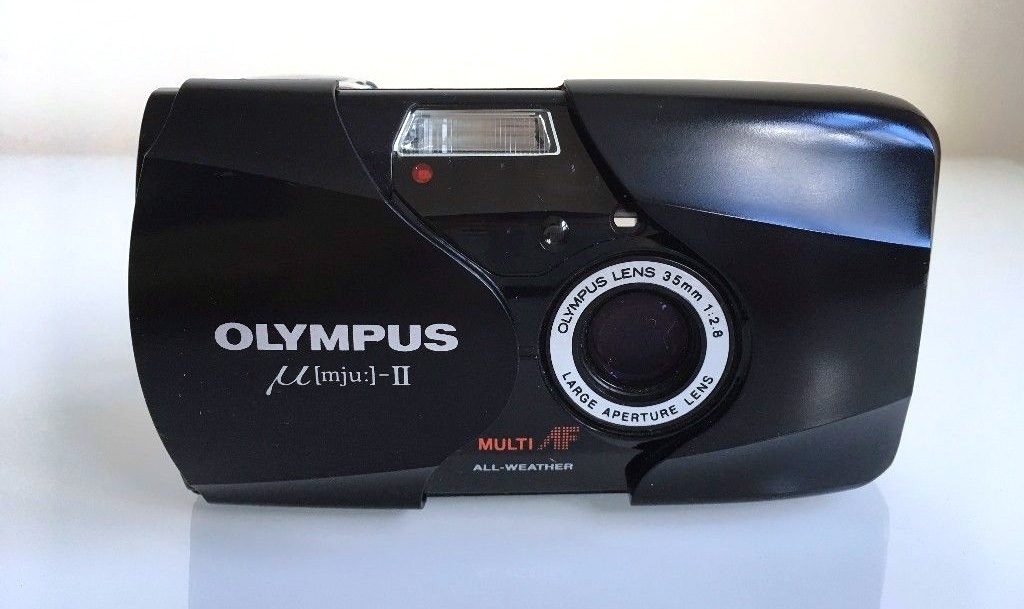
Olympus Stylus Epic
In our 15 Best Film Cameras we also herald the most basic point and shoots. You will note that I am being very specific with the model here: Olympus Stylus Epic ‑ 35mm f/2.8. NOT the other, (especially zoom), models. This is a camera you will occasionally have seen being used by a Helmut Newton or similar high profile photographers. Reason? Powerful flash, pocketable, awesome lens, accurate auto exposure. This is a very under rated camera that should be twice the price in the used market. They came in a couple of colors. I’ve yet to find one person, myself included, that does not love this camera. And handles the rain well.
Average price: $60-$140
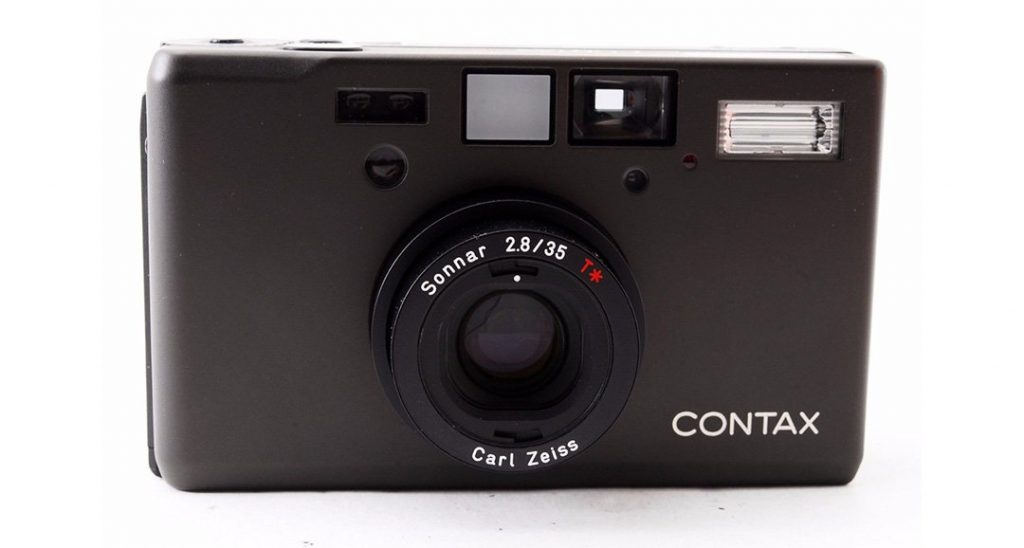
Contax T3
Ok,…this one is “off the charts”. But not just in price. The images out of this little gem easily compare to a medium format camera. The microcontast is mind boggling. I wrote an article on a borrowed Contax T3. I think my statement was “Holy Cow, Batman!”. This thing is like a palm sized Hasselblad! My “Best Film Camera” list did not include this camera. So, I’m a little embarrassed. I also included images from various photographers to explicitly illustrate that it ain’t the photographer. It’s the camera and lens. There may be things about this camera you don’t like. I wish it was a little bigger, for example.But trust me when I say that the build is beyond reproach. The body is Titanium, shutter button, viewfinder and AF windows are sapphire,…not glass! (synthetic, of course)
Average price: $750-$1200
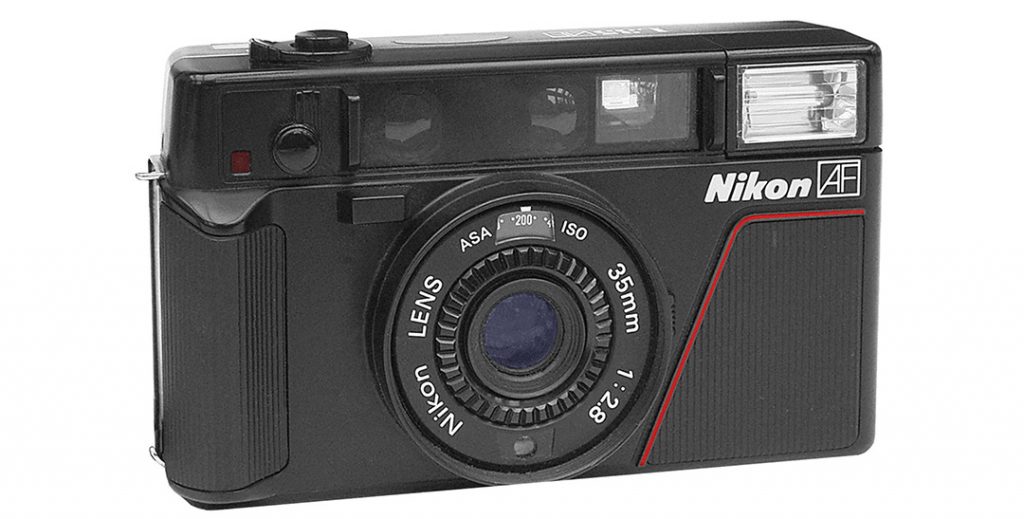
Nikon L35AF
The flash is automatic,…sorta. It will automatically flash if the meter doesn’t see enough light. But the cool thing is it can be over ridden. Flash off mode is just pushing the flash down. To turn it on, just put a finger over the meter “eye” for a second and the flash will “turn on”. As far as the image difference between a Nikon L35AF and the others, (Contax, Yashica, Olympus, etc.), the images are different between every one of these. Not better, not worse. Just different. But with the extra features on the Nikon, and the price differentials, it’s definitely a compact camera that should be on your short list. I’ve seen a “Mint” Nikon L35AF go for as little as $20. Built in motor drive and auto-rewind, takes filters, AA batteries, sharp lens, simple to use, exposure compensation. What more do you need? Takes 46mm filters,….but no filters on the AW model. (no threads) Why? No clue. Nikon forgot.
Average price: $25-$150
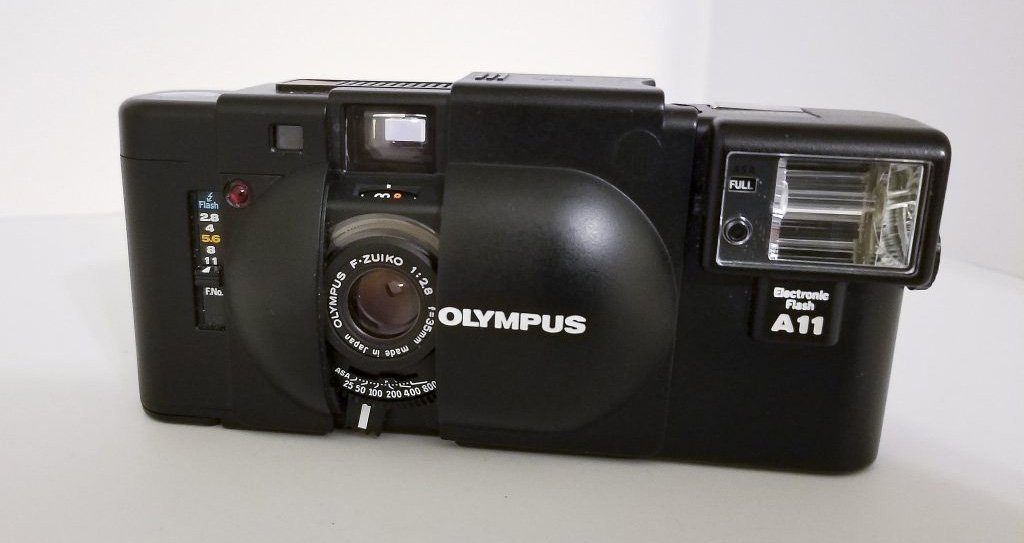
Olympus XA2
The original Olympus XA came out in 1979. It had an actual rangefinder focusing mechanism and an aperture priority exposure system within it’s relatively small footprint. A true accomplishment in 1979. And the six element Zuiko 35mm f/2.8 lens and a shutter to 1/500 made it a real camera capable of some awesome imaging. Even to this day. Along with the very powerful A11 flash, that attached seamlessly to the body, why more people don’t opt for this camera over a Yashica T4 leaves most photographer’s scratching their collective heads. The Olympus XA2 is extremely sharp, and it’s fans rarely let one go.
Average price: $50-$150 (with flash)

Canon AF35M
The Canon AF35M is their answer to Nikons L35AF. They even kind of look alike. Some would say it’s boring. I guess. But it’s meter is unbelievably good. Night, snow, beach. Doesn’t matter. Considering it uses a simple CdS photo-resistor for auto exposure, it’s very accurate. Better than the Nikon? Not really. But if you prefer Canon, and have a black heart when it comes to Nikon, this camera is just the ticket. It’s kind of like an 8 track player from the 80’s. Make sure you’re wearing your Jordache jeans, and you’re good to go. As clunky as it looks, it’s really a well balanced camera. Pictures are sharp and viewfinder is clear and sufficiently sized.That said, it does have a focus indicator I would call,….”useless”. While it does have a “Pre-Focus Lever” to selectively focus, I find the Nikon’s half press shutter and recompose procedure quite superior. But, I am a ‘Nikon’ guy.
Average price: $15-$130
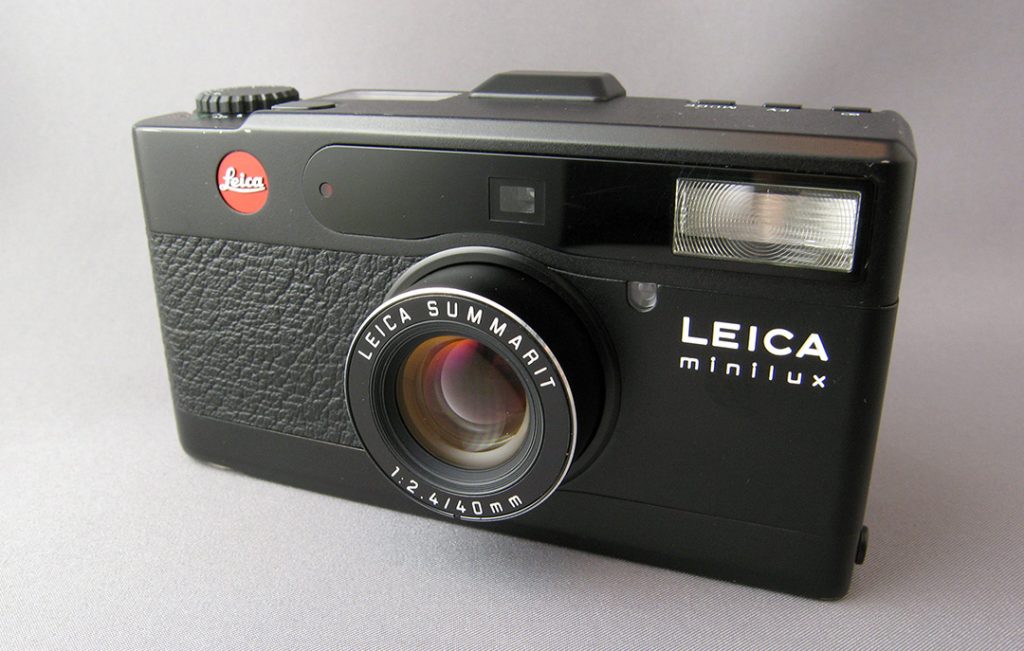
Leica Minilux
If you’re looking for build quality and a little red dot,…well, you got the Leica Minilux. I even think the zoom version of this camera is the bee’s knee’s. (and much cheaper) But, everyone else will tell you to get the 40mm fixed lens version. And the fixed focal length is sharper,…a little. Anecdotally, some have issues with this camera. But I think they’re expecting an ‘M’. An M it ain’t. But as premium point and shoots go, it’s all Leica! The viewfinder is clear. And is stout, sturdy, and dense as you would expect. Designed by Leica in Germany, it was actually built in Japan. (probably Minolta) But the shell is Titanium, with most of the internal parts are metal. I really love the black, but most are a soft silver. The glass was advertised as being on par with the ‘R’ and ‘M’ lenses. In fact, the Summarit 40mm lens actually lives up to the legend. Why else would you buy a Leica?
Average price: $450-$800

Konica Big Mini
I love this camera. If I were going to pick the ultimate bargain out of the herd, this would be it. Considering it’s stellar performance to cost ratio,…it’s unbeleivable! This camera has become a cult classic before it’s time.While the lens motor and film advance are the noisiest I’ve ever heard in a point-and-shoot, that is the end of any complaints. The lens is sharp as a tack, and the elegant design and finish put the Olympus and Yashicas to shame. With an EV button right there, compensation is a breeze. So what’s the problem? The Konica Big Mini suffers from a failing shutter button with very heavy use. It just wears out. Kind of weird. However, I’ve seen mint examples for $20! Buy 2, and don’t worry about it. The Leica Minilux has the infamous E02 error. But Big Mini’s are plentifull and cheap.
Average price: $30-$200

Minolta Hi-Matic
The thing about the Minolta Hi-Matic is it seemed Minolta named a lot of different cameras ‘Hi-Matic’. Introduced in 1962, you had the manual ones, the auto advance ones, the AF ones,….you would think they could come up with other names.But I’m just going to address the 1979 Hi-Matic AF, the 1981 Hi-Matic AF2 and the 1984 Hi-Matic GF. The lenses were also different. Some had 38mm lenses, some had 40mm lenses, some were f/2.7 and some f/1.7! But all Rokker lenses. And the most sought after is probably the Hi-Matic 7 SII which came out in 1977. But that had no built in flash and wasn’t AF, so I can’t really consider it a point and shoot. But the Hi-Matic AF2 is quite well built, inexpensive and a underrated killer in use.
Average price: $50-$100
And, that’s my 10 best film point and shoots. 😁

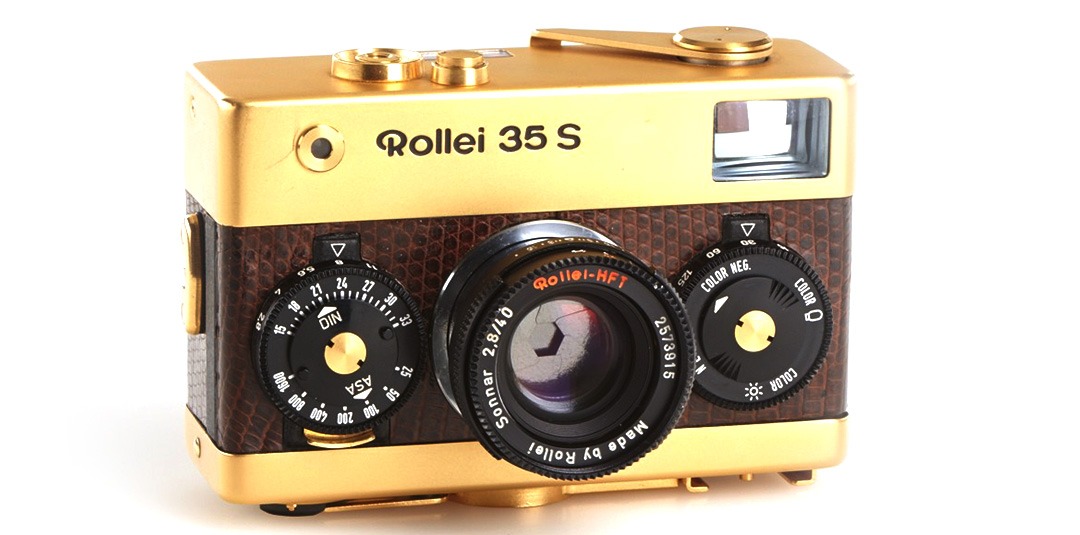
I have the Nikon L35AF2 and i love it :>
The Nikon is a great camera. Thankfully underrated. (keeping prices low) 🙂 https://anatomyfilms.com/nikon-l35af-not-hip-enough/
This article remind me of the past! Nice work! 🙂
😁